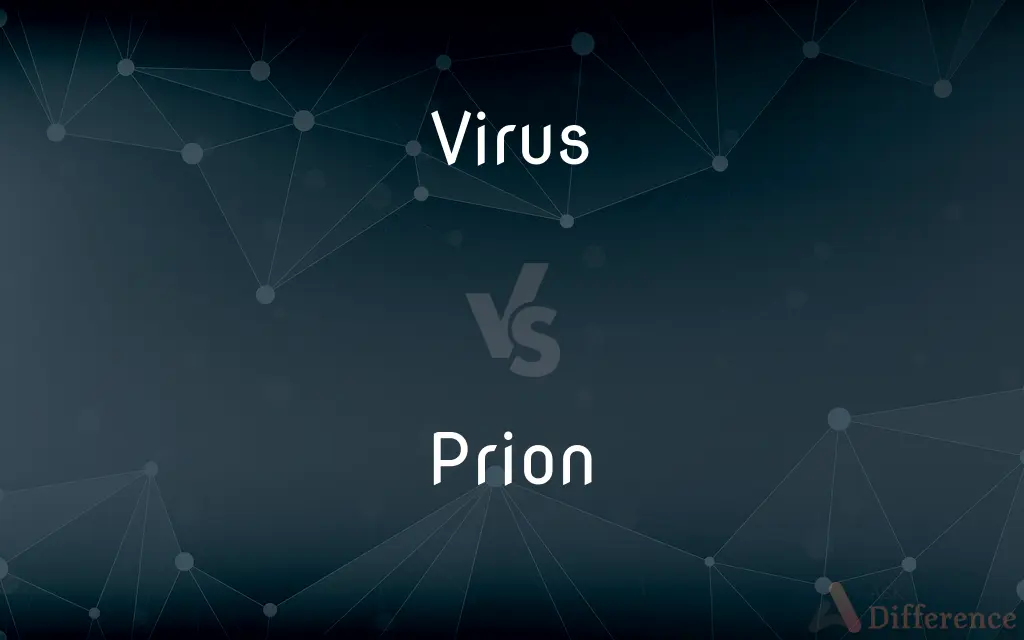Virus vs. Prion — What's the Difference?
Edited by Tayyaba Rehman — By Fiza Rafique — Updated on September 25, 2023
Virus is a microscopic infectious agent with genetic material that requires a host cell to replicate. Prion is a misfolded, infectious protein particle that can induce abnormal folding in normal proteins.

Difference Between Virus and Prion
Table of Contents
ADVERTISEMENT
Key Differences
Virus has genetic material (DNA or RNA). Prion:Misfolded protein.
Virus: Requires a host cell. Prion: Self-replicating.
Comparison Chart
Nature
Genetic material with a protein coat
Misfolded infectious protein
Replication
Requires a host cell for replication
Self-replicating
Associated Diseases
Various diseases, e.g., flu, HIV, COVID-19
Neurodegenerative diseases, e.g., CJD
ADVERTISEMENT
Treatment
Vaccines and antiviral drugs
No vaccines or treatments available
Sterilization
Deactivated by disinfectants
Resistant to conventional sterilization
Compare with Definitions
Virus
Microscopic infectious agent requiring a host cell.
The flu virus causes seasonal outbreaks.
Prion
Misfolded infectious protein inducing abnormal folding.
Prions are responsible for Creutzfeldt-Jakob disease.
Virus
Genetic material enclosed in a protein coat.
COVID-19 is caused by the SARS-CoV-2 virus.
Prion
Self-replicating, disease-causing protein particles.
Mad Cow Disease is linked to prions in contaminated meat.
Virus
A virus is a submicroscopic infectious agent that replicates only inside the living cells of an organism. Viruses infect all life forms, from animals and plants to microorganisms, including bacteria and archaea.
Prion
Prions are misfolded proteins with the ability to transmit their misfolded shape onto normal variants of the same protein. They characterize several fatal and transmissible neurodegenerative diseases in humans and many other animals.
Virus
Any of various submicroscopic agents that infect living organisms, often causing disease, and that consist of a single or double strand of RNA or DNA surrounded by a protein coat. Unable to replicate without a host cell, viruses are typically not considered living organisms.
Prion
A protein particle that is the agent of infection in a variety of neurodegenerative diseases, including bovine spongiform encephalopathy, Creutzfeldt-Jakob disease, and scrapie. Prions are the only known infectious agents that do not contain DNA or RNA. They derive from a normal body protein that becomes irreversibly misfolded, and they proliferate in the body, possibly by acting as a template for further protein misfolding.
Virus
A disease caused by a virus.
Prion
(molecular biology) A self-propagating misfolded conformer of a protein that is responsible for a number of diseases that affect the brain and other neural tissue.
Virus
A computer program or series of commands that can replicate itself and that spreads by inserting copies of itself into other files or programs which users later transfer to other computers. Viruses usually have a harmful effect, as in erasing all the data on a disk.
Prion
A petrel of the genus Pachyptila.
Virus
A harmful or destructive influence
The pernicious virus of racism.
Prion
Any of several types of protein particle lacking nucleic acid, believed to be the cause of certain slow-developing infectious diseases such as scapie in sheep, and Creutzfeldt-Jakob disease and Kuru in humans.
Virus
A submicroscopic, non-cellular structure consisting of a core of DNA or RNA surrounded by a protein coat, that requires a living host cell to replicate, and often causes disease in the host organism; such agents are often classed as nonliving infectious particles and less often as microorganisms.
Prion
(microbiology) an infectious protein particle similar to a virus but lacking nucleic acid; thought to be the agent responsible for scrapie and other degenerative diseases of the nervous system
Virus
(uncountable) A quantity of such infectious agents
Virus
A disease caused by such an infectious agent; a viral illness.
He's got a virus and had to stay home from school.
Virus
(archaic) Venom, as produced by a poisonous animal etc.
Virus
(computing) A type of malware which can covertly transmit itself between computers via networks (especially the Internet) or removable storage such as disks, often causing damage to systems and data; also computer virus.
Virus
Any type of malware.
Virus
(figurative) Any malicious or dangerous entity that spreads from one place or person to another.
Virus
To send or infect an electronic device with a computer virus.
I'm just going to virus anyone who tries cheating on this game.
Virus
Contagious or poisonous matter, as of specific ulcers, the bite of snakes, etc.; - applied to organic poisons.
Virus
The causative agent of a disease, .
Virus
Any of numerous submicroscopic complex organic objects which have genetic material and may be considered as living organisms but have no proper cell membrane, and thus cannot by themselves perform metabolic processes, requiring entry into a host cell in order to multiply. The simplest viruses have no lipid envelope and may be considered as complex aggregates of molecules, sometimes only a nucleic acid (DNA or RNA) and a coat protein. They are sometimes viewed as being on the borderline between living and nonliving objects. They are smaller than living cells in size, usually between 20 and 300 nm; thus they pass through standard filters, and were previously referred to as filterable virus. The manifestations of disease caused by multiplication of viruses in cells may be due to destruction of the cells caused by subversion of the cellular metabolic processes by the virus, or by synthesis of a virus-specific toxin. Viruses may infect animals, plants, or microorganisms; those infecting bacteria are also called bacteriophages. Certain bacteriophages may be non-destructive and benign in the host; - see bacteriophage.
Virus
Fig.: Any morbid corrupting quality in intellectual or moral conditions; something that poisons the mind or the soul; as, the virus of obscene books.
Virus
A program or segment of program code that may make copies of itself (replicate), attach itself to other programs, and perform unwanted actions within a computer; also called computer virus or virus program. Such programs are almost always introduced into a computer without the knowledge or assent of its owner, and are often malicious, causing destructive actions such as erasing data on disk, but sometime only annoying, causing peculiar objects to appear on the display. The form of sociopathic mental disease that causes a programmer to write such a program has not yet been given a name. Compare trojan horse{3}.
Virus
(virology) ultramicroscopic infectious agent that replicates itself only within cells of living hosts; many are pathogenic; a piece of nucleic acid (DNA or RNA) wrapped in a thin coat of protein
Virus
A harmful or corrupting agency;
Bigotry is a virus that must not be allowed to spread
The virus of jealousy is latent in everyone
Virus
A software program capable of reproducing itself and usually capable of causing great harm to files or other programs on the same computer;
A true virus cannot spread to another computer without human assistance
Common Curiosities
Are there vaccines for viruses?
Yes, vaccines exist for many viral diseases.
How do you deactivate viruses?
Disinfectants can effectively kill viruses on surfaces.
What is a virus?
A virus is a tiny infectious agent with genetic material that requires a host cell to replicate.
Can you give an example of a virus?
COVID-19 is caused by the SARS-CoV-2 virus.
What is a prion?
A prion is a misfolded, self-replicating protein that can induce abnormal folding in normal proteins.
How can viruses be treated?
Antiviral drugs are used to manage viral infections.
Are there vaccines or treatments for prion diseases?
Currently, there are no vaccines or treatments for prion diseases.
Why are prions resistant to sterilization?
Prions are highly resistant to conventional sterilization methods.
Can you provide an example of a prion-related disease?
Creutzfeldt-Jakob disease (CJD) is caused by prions.
Are prion diseases common?
No, prion diseases are rare but often fatal neurodegenerative conditions.
Share Your Discovery

Previous Comparison
Love vs. Marriage
Next Comparison
Good vs. HappyAuthor Spotlight
Written by
Fiza RafiqueFiza Rafique is a skilled content writer at AskDifference.com, where she meticulously refines and enhances written pieces. Drawing from her vast editorial expertise, Fiza ensures clarity, accuracy, and precision in every article. Passionate about language, she continually seeks to elevate the quality of content for readers worldwide.
Edited by
Tayyaba RehmanTayyaba Rehman is a distinguished writer, currently serving as a primary contributor to askdifference.com. As a researcher in semantics and etymology, Tayyaba's passion for the complexity of languages and their distinctions has found a perfect home on the platform. Tayyaba delves into the intricacies of language, distinguishing between commonly confused words and phrases, thereby providing clarity for readers worldwide.














































